Congressman Smith’s Remarks on Human Trafficking and Addictions
Excerpts as prepared for delivery to NJ’s Ninth Annual Human Trafficking and Awareness Event
Rep. Chris Smith (R-NJ)
War Memorial, Trenton, NJ
January 25, 2019
Thank you Attorney General Gurbir Gewal, Assistant AG Annmarie Taggart Director Veronica Allende and Program Coordinator Kathy Friess for your extraordinary personal and professional commitments to ending modern-day slavery—in all its horrific manifestations.
And special thanks to all the amazing leaders here today including trafficking survivor Marti MacGibbon, Dawne Lomangino-DiMauro, Director of DreamCatchers, and awardee Detective Frank Sabella—for being on the front lines against unspeakable cruelty.
And it’s always good to see Angelo Onofri—a great county prosecutor.
The nexus between substance abuse and human trafficking—a focus of today’s event—is well established but underappreciated by many, but not you.
Just two months ago, we saw Dominic Roach of Camden get a long prison term for forcing two drug-addicted women into prostitution and taking the money they collected. He kept the victims compliant and reliant on him by bringing them drugs.
We know from research that many victims of human trafficking come from unstable homes and are more likely to have grown up with at least one parent addicted to drugs or alcohol—one study conducted in Chicago puts the number at 83%.
Not only is family drug use making children more vulnerable to human trafficking, but human trafficking makes a child more likely to use drugs themselves in order to cope with the pain and trauma during and after trafficking.
According to a study by D.M. Hughes of the University of Rhode Island (2005), more than 70 percent of trafficking victims reported using illegal substances.
We can and should expect that trafficking victims will be vulnerable to substance abuse and vulnerable to re-trafficking if substance abuse and complex trauma of trafficking are not both treated.
This is why it is so critical that we ensure that our professionals who treat drug addiction are also trained to recognize and address the complex trauma of human trafficking. We must also ensure that our trafficking programs are sufficiently comprehensive to include treatment for substance abuse.
I am especially looking forward to hearing and learning from Detective Maria Ingraffia’s talk on Human Trafficking Victims with Addiction.
Twenty years ago, when I first introduced the Trafficking Victims’ Protection Act (TVPA), the legislation was met with a wall of skepticism and opposition—dismissed by many as a solution in search of a problem. For most people at that time, the term trafficking applied almost exclusively to drugs and weapons. Reports of vulnerable persons—especially women and children—being reduced to commodities for sale were often met with surprise, incredulity or indifference.
My legislation, signed into law in 2000, created a well-funded, bold new whole-of-government domestic and international strategy that created numerous new programs to protect victims, prosecute traffickers and to the extent possible prevent it in the first place—the three Ps.
It included a number of sea change criminal code reforms—including treating as a victim—and not a perpetrator of a crime—anyone exploited by a commercial sex act who had not attained the age of 18 and anyone older where there was an element of force, fraud or coercion.
The TVPA changed the US criminal code to authorize asset confiscation and jail sentences of up to life imprisonment for traffickers.
It included sheltering and created a new asylum category—the T visa—to protect victims and their families.
Among its many provisions, the Trafficking Victims Protection Act created the President’s Interagency Task Force to Monitor and Combat Trafficking in Persons, the U.S. State Department’s Trafficking in Person’s Office and annual TIP report with its tier grading of every nation’s record in making “serious and sustained efforts” to eliminate human trafficking. Those relegated to what we call Tier 3—egregious violators—are subject to sanctions.
Two weeks ago, the President signed my fifth anti-human trafficking bill into law—the Frederick Douglass Trafficking Victims Prevention and Protection Act.
That law provides over $430 million for a myriad of programs and new initiatives; it also includes reauthorization of International Megan’s Law . Enacted in 2016, the Angel Watch Center created by the Internal Megan’s Law has already provided notice to destination countries of 3,442 convicted pedophiles who may be traveling to exploit children.
Of particular importance, the new Frederick Douglass Act also authorizes the Secretary of Health and Human Services, in consultation with the Secretary of Education and the Secretary of Labor, to award grants to local educational agencies, in partnership with a nonprofit, nongovernmental agency, to establish, expand, and support programs:
- to educate school staff to recognize and respond to signs of sex and labor trafficking;
- to provide age-appropriate information to students on how to avoid becoming victims of sex and labor trafficking.
When I introduced the legislation, Frederick Douglass’ great, great, great grandson Kenneth Morris spoke at the press conference underscoring the critical need to educate our youth, a main focus of the Frederick Douglass Family Initiatives organization.
As the Special Representative on Human Trafficking Issues to the Organization for Security and Co-operation in Europe Parliamentary Assembly (OSCE PA)— an international organization of leading lawmakers representing over one billion people worldwide— I plan to introduce a resolution this year calling for initiatives to raise human trafficking awareness among children in the 57-member countries to help prevent future victims of trafficking.
Kenneth Morris also said, “If my great ancestor were here today, I believe he would be driven to lead the struggle against contemporary forms of slavery.”
Thank you all here this morning for your leadership to end modern day slavery and free victims from its bondage.
May we all fight injustice and exploitation as Frederick Douglass did—with courage, insight, compassion and tenacity.

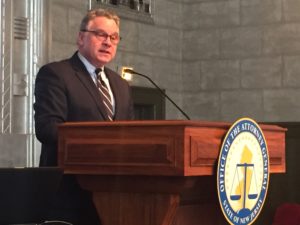
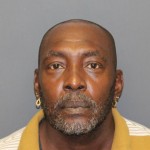


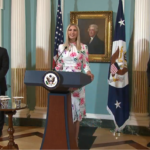
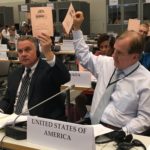
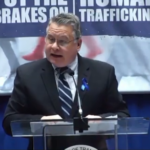

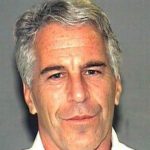
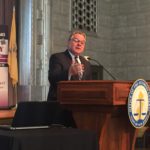
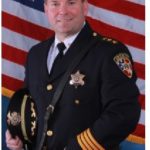
Congressman Chris Smith! And, to all wishful thinkers, I think he’s running again in 2020, and, hello, he needs some help down there, from NJ!!